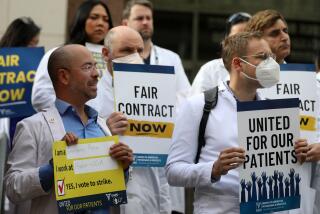AFL-CIO to Pressure Congress for Health Cost Curbs : Labor: Strikes mount as employers attempt to transfer higher premiums to workers. The medical profession is expected to oppose controls.
- Share via
WASHINGTON — Weary of an increasing number of strikes caused by management insistence that workers pay a greater share of their health benefits, AFL-CIO leaders vowed Wednesday to step up pressure on Congress for federal controls on doctor and hospital costs.
Thousands of rank-and-file union members will visit congressmen in their home districts to let them know that the issue of soaring health costs “is moving off the bargaining table and into their laps,” said John Sweeney, president of the Service Employees Union International.
Labor leaders offered few specifics about the type of national health plan that they want Congress to adopt, saying that their initial goal is to build a national coalition that can overcome the medical profession’s staunch opposition to government regulation of health care.
Organized labor has sought congressional approval of national health care controls for decades without success. But the latest strategy represents a belief that many corporations are now as weary of fighting over health care as the unions and are willing to join labor in putting increased pressure on state and federal legislators to control costs faced by employers.
“This is a grass-roots campaign intended to heat up the battle as much as anything,” one official said.
Many recent major strikes, from coal miners in Virginia to phone operators in New York, were triggered by workers’ refusal to give in to employer arguments that employees need to defray a larger part of health care costs, which are rising by as much as 20% a year.
Nationwide, unions have been settling for contracts with wage increases averaging 3% to 4% a year, but they have been exhibiting increased militancy when asked to give up health plans that in the past provided 100% coverage of health care expenses. Today, only about a quarter of American companies offer such benefits.
A bitter 100-day strike by 60,000 members of the Communication Workers of America and the Brotherhood of Electrical Workers against the Nynex Corp. in New York and the Northeast was settled this week only after the company dropped a requirement that employees begin paying premiums to retain 100% coverage.
Employers have tried a variety of cost-control techniques, often with cooperation from unions, to hold down medical expenses. But these plans, most of which limit employee discretion in choosing between health care options, have not made a significant dent in the cost of health care, as evidenced by sharp increases in 1990 premiums.
“Health care inflation is . . . worse than ever, and employer attempts to transfer the increased costs have resulted in an escalating breakdown in labor-management relations,” Sweeney said in a press conference
Rick Icaza, president of the United Food and Commercial Workers Union Local 770 in Los Angeles, said in an interview that an example of the kind of pressure labor wants to bring could come next year when 82,000 supermarket clerks and meat-cutters negotiate a new contract.
Icaza, who also serves as president of the Los Angeles County Federation of Labor, said that he wants the new contract with supermarkets to contain a promise that they will join local unions in lobbying for government health controls.
Workers are fed up with management insistence that absorbing health care increases makes it impossible to offer a respectable hourly wage increase, Icaza said.
More to Read
Inside the business of entertainment
The Wide Shot brings you news, analysis and insights on everything from streaming wars to production — and what it all means for the future.
You may occasionally receive promotional content from the Los Angeles Times.










